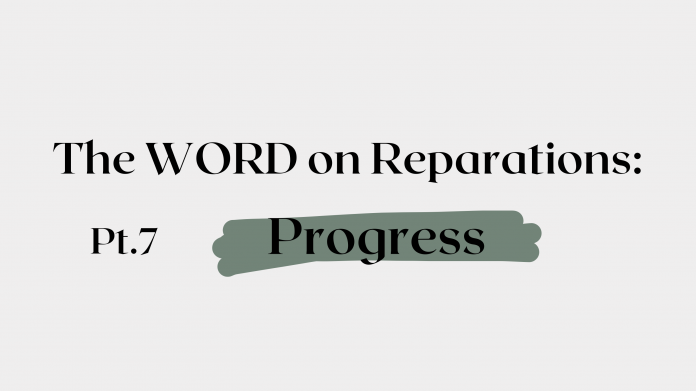Progress. Progress is the fuel of life; it’s what powers all forward movement, what powers ideas — and it is one of the foundational ideals of our nation. This is a nation that revolted to be ruled by its population and, as it spread its democratic ideals, was seen as progress itself. However, we all know how this progression was fueled off the backs of Indigenous peoples and Black Americans as their communities were destroyed and the United States of America bragged about its incredible progress. As the United States set industry standards worldwide, the demographics who built it stagnated under oppression and destruction, losing the ability to catch up.
So, what does progress mean to Black America? What does it mean for Black Americans? We live in a nation that viewed our ancestors as stepping stones — objects used to generate revenue discarded after use. When slavery ended and we could no longer be used, we were separated, quarantined away from the rest of the population as a threat to society, an unnecessary part of the American fabric, like takeout containers after you’ve eaten all the food. Black America was forced to sacrifice everything for American progress — and were told to be thankful for the opportunity to be used by such a “progressive” nation.
Black America has seen the double-sidedness of American progression. There was an obsession with the Second Amendment — until the Black Panthers held guns in defense at the Capitol. Until Philando Castile was underneath an officer, begging for breath because he may have had a gun. We have seen how important progress is until it is our progression — how the First Amendment allows the flying of Confederate flags beside highways but doesn’t allow Colin Kaepernick to kneel. America stuffs its ideals of progression down our throats, then slaps us in the face when we ask for the same freedoms.
Analyzing the economic differences between Black and White America makes this difference in progress even more obvious — when you read statistics that say in 2016, the median net worth of a Black family was $17,600, while the median net worth of a white family was $171,000. When you read statistics concerning maternity mortality rates, health care access and homeownership rates. You can see it in every facet of our country — way too many for me to outline in a 600-word letter.
The gaps between Black and white Americans have been obvious for years — and attempts to close them have been made. However, all of these attempts focus on Black people digging ourselves out of the pit as a community. There is nothing wrong with community advocacy and working to close these gaps — but we need to remember that Black people did not cause this gap. The suffering of Black America was created by American progress — a progression that relied on our oppression to continue. The inequities Black America experiences are not just side effects — they are intentionally engineered so America can keep benefiting at our expense. Our oppression fuels American progress; it always has.
When it comes to progress for Black America, what is needed is reparations. Repairing the damage that the Black community has experienced is the only way to tackle the oppression that we experience on a systemic level. It is the only way for Black America to experience progress in a nation built off of our losses, our destruction and our oppression.
Salimata Sanfo ’22 is a government major at the College. She is a founder of the Cooperative Change Fund, and is a part of PLUMAS, Syndicate, Afrodite, Reparations Committee and the Student Rights Initiative. Email Salimata at sasanfo@email.wm.edu.

